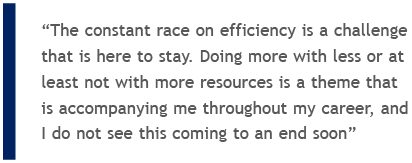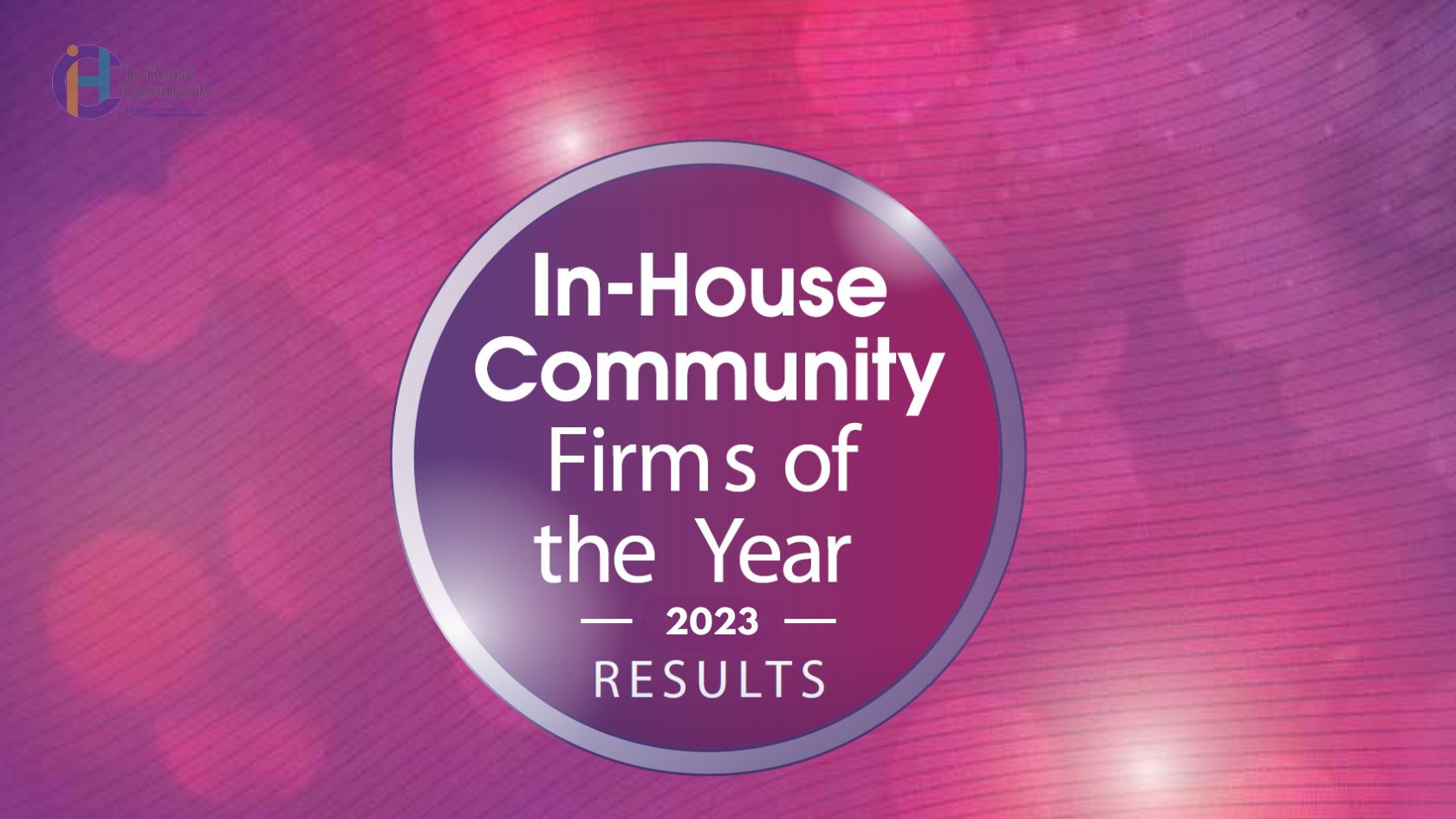We speak to the head of group legal for the Middle East & Asia Pacific at DNV GL, the world’s largest classification society, about change, technology and running a lean and efficient legal organisation.

Sigrid Wettwer is head of group legal Middle East & Asia Pacific for DNV GL, which won both the Energy & Natural Resources and Small Team of the Year categories at the 2019 In-House Community Awards.
Tell us a little about your professional background and how you came to your current role?
As a German / UK qualified lawyer my original specialisation was in maritime law. Starting my career as inhouse counsel at the ship classification society Germanischer Lloyd in Hamburg, I was heading a team of lawyers looking after the company`s maritime core business when it merged with the Norwegian Det Norske Veritas to form DNV GL in 2013. After the merger I became head of the central European team and was largely involved in restructuring and post-merger integration before moving to Singapore in mid-2018 to lead DNV GL Group Legal Middle East & Asia Pacific. Since I had already been seconded to Germanischer Lloyd’s Shanghai Office in 2009, working and living in Asia was not entirely new to me.
I studied law in Hamburg, Lausanne, Cape Town and London and hold the first and second German state exam in law and an additional master’s degree in shipping law from the University in Cape Town. I am admitted to the German bar and the roll of Solicitors of England & Wales.
How big is the team you work in and how is it structured?
I am currently heading DNV GL’s Middle East & Asia Pacific team within group legal, which is one of three regional teams, and report to DNV GL’s general counsel Thor Winther in Oslo, Norway. In my role I am blessed with a small, but highly qualified and dedicated team of lawyers with diverse cultural and educational backgrounds. We cover the Region Middle East & Asia Pacific, which for us means 28 countries where DNV GL is present with local offices. The team currently counts five lawyers, one in Shanghai, two in Dubai and two here in Singapore. We are covering a wide range of legal matters including commercial law for the five business areas of DNV GL (maritime, oil & gas, energy, business assurance and digital solutions), corporate law, litigation, IP as well as some aspects of labour law.
What do you think are the biggest challenges facing in-house lawyers today?
The constant race on efficiency is a challenge that is here to stay. Doing more with less or at least not with more resources is a theme that is accompanying me throughout my career, and I do not see this coming to an end soon. This not only requires inhouse lawyers to stay up to date with legal technology, but also to work on personal efficiency. The biggest challenge for a lawyer in this context is to get priorities right. To be the best possible support for your business lawyers have to strictly prioritise. You cannot afford to spend a lot of time on drafting beautiful contract stipulations if the project’s margin is low. So, you have to gain a deep understanding of the business, your company’s risk appetite and adjust your legal advice to it.
Furthermore, the fast pace of change in the professional environment and the constantly growing uncertainty remains a constant challenge. This not only applies to the long-term sustainability of well-established business models, but also to a changing legal landscape, especially on the international scale. Considering the speed of digitalisation in basically all business areas, we are frequently forced to embark on areas with high legal uncertainties, often simply because legislators struggle to keep pace with technological developments.

What have been your own biggest challenges?
Demanding legal projects have become a constant in my professional life — sometimes combined with other challenges like internal restructurings or takeovers. I enjoy both. To further build my ability to evaluate complex situations correctly and to make decisions accordingly was often demanding, but vital for my professional development. Also, to balance a challenging career in an international setting and a private life with two toddlers requires you to develop the necessary resilience and right mind-set.
What are the biggest challenges specific to your industry?
We have entered a decade of transformation where the pace of the energy transition will be set and digital technologies underpinning industry 4.0 will mature from experimentation into large-scale application. This brings huge opportunities and risks for DNV GL as well as our clients.
We expect the energy mix to be equally split between fossil and non-fossil fuels by mid-century, which is a dramatic change. Whilst our customers in the powers and renewables sector are generally well positioned to exploit this transition, some of the industries we operate in, such as the maritime and oil & gas sectors, are more difficult to decarbonise.
Likewise, there is no uniform picture amongst our customers when it comes to digitalisation. We as DNV GL are working hard to ensure that we are at the forefront of the fourth industrial revolution. We are using blockchain to increase supply chain transparency and our Veracity industry platform is an ecosystem that combines our expertise, our customers’ data and third-party applications.
How is technology changing the way you work?
Over the past years we have introduced a variety of IT tools to support our legal work in DNV GL. This includes a global legal entity management system where we store and update the corporate data of our approximately 240 legal entities worldwide and a group legal internal case management system (IManage). Both have contributed immensely to our internal transparency as well as efficiency. In my experience new tools usually come with a learning phase that requires its users to invest some time and effort. However, this will usually pay off by achieving the above-mentioned improvements. Within the legal team we are currently preparing for a launch of an internal chatbot that hopefully will be able to answer most of the FAQs coming from our internal customers. Provided we will come up with a workable solution, I believe the bot will free up time for us to work on more relevant tasks.
Apart from this we constantly work on improving the use of tools already provided. Once you start diving into the functionalities of an office package preinstalled on your computer you might be surprised about the possibilities to optimise your daily work.
What do you most look for in a law firm when outsourcing work?
Usually we are looking for two main attributes when outsourcing legal work: Firstly, the lawyer working on the task needs to bring the right legal competency. For our cases this is usually not only a matching legal specialisation, but also local knowledge often beyond specifics of the respective legislation. Secondly, we need legal support that comes with the right, pragmatic mindset. This applies to the proposed solutions for legal problems as well as to the way legal work is presented. Most of our internal customers have an engineering background and are not coming from finance or legal functions. When we obtain legal advice, it is important that it is presented in a way that allows us as in-house counsel to use it internally without further “translations”. In DNV GL we seek to achieve this by using two large panel law firms with global spread, Norton Rose Fulbright and Eversheds, as our go-to partners. However, especially in our region we are often confronted with legal problems stemming from countries where these firms are not established. Hence, we also frequently work with lawyers outside of our panel network.
Other than law firms, what sort of other service providers and tools help you most as a legal department?
Apart from law firms we are working with providers for corporate secretarial service, forensic experts, auditing firms and legal service providers to cover longer leave periods or unusual workload peaks. All of the above can prove to be very helpful when it comes to run a lean and efficient legal organisation. Especially a well-functioning corporate secretariat service provider is very valuable in an international environment.

What aspects of your role do you most enjoy?
You might be surprised to hear this from someone who worked in the same organisation for over a decade, but what I really enjoy about my role in DNV GL is the constant change. We are operating in a fast changing and uncertain environment and I believe our company is exceptional in anticipating future challenges for our customers and thereby our own business. I very much enjoy being part of this exciting journey. An equally large factor for me are the people I work with. This not only applies to our remarkable legal team in DNV GL, but also to the operational colleagues. We have outstanding technical experts who work on the forefront of technical and technological developments and who are an inspiration to work with, especially if you enjoy working cross-functional as much as I do.
Looking forward, what changes do you foresee in the way that legal services will be provided in coming years?
As mentioned before, I am convinced that the race for efficiency will continue, so optimisation and setting right priorities are tasks that will stay. Apart from this I especially believe that the global legal landscape will continue to become more complex, also in consideration of the changing political environment (eg, protectionism, trade wars and sanctions). Working in a multinational company and being tasked with safeguarding compliance with all these diverse regulations will continue to be a challenge for lawyers. In order to be able to do so I think there is need to work smarter on theses (and other) tasks. In my view there will be no other way than embracing legal tech going forward, even if this will disrupt the way we are used to work as lawyers in one way or the other.
What advice would you give to young lawyers starting out in their careers today?
For me a sound legal education is only the starting point of a career in the legal field. What commercial lawyers need to develop in addition is a good understanding of the business they are working in as well as its financials. Furthermore, the modern working environment requires a new type of teamwork. The days where a lawyer produced his work alone behind closed doors are gone. Moreover, the ability to collaborate across different geographies, cultures and professions is needed to build a successful career in today’s globalised environment. In this regard outstanding communication skills and intercultural understanding are vital. Finally, I believe it is essential to embrace change and new ways of working, also to be prepared for a possible disruption of legal services. In this regard life-long learning is required, but thankfully this can be great fun as well!
What do you most like to do away from work?
Having a job that most of the time requires me to sit at a desk or meeting table I like to do sports in my free time. It helps me to balance body and mind after a day full of work. Apart from this I enjoy the time with my friends and family. Our children are still young, but I can already see that these precious years will pass quickly. I also very much like travelling and thereby discovering new places, tastes and impressions. This is one of the best ways for me to recharge. Lastly, I am a keen hobby photographer and luckily both my family and travels are providing me with many occasions to take pictures.





















